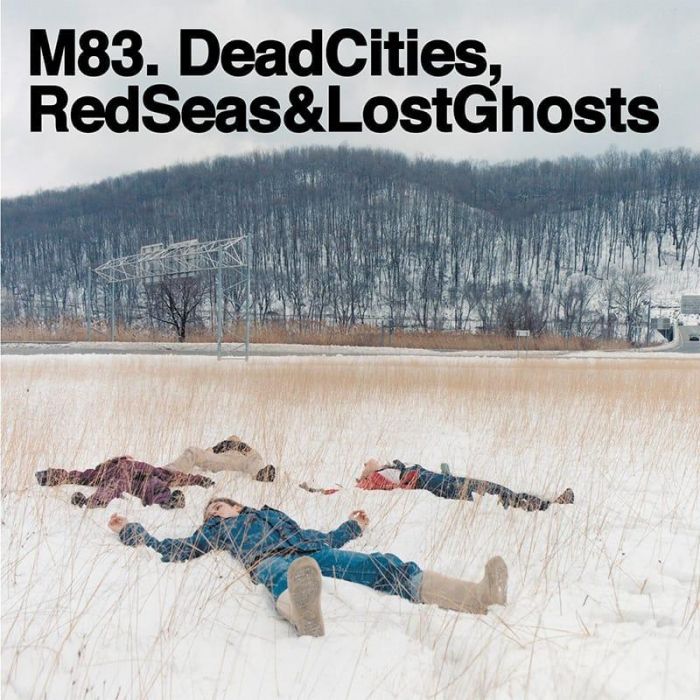Dead Cities, Red Seas & Lost Ghosts by M83 (Review)

Having listened to M83’s debut album many times, the one trait that continually strikes me with each listen is its complete and utter lack of subtlety. Throughout the 12 tracks that make up Dead Cities, Red Seas & Lost Ghosts, the duo of Nicolas Fromageau and Anthony Gonzalez do everything they can to confront and dazzle the listener with massive walls of sound constructed primarily of My Bloody Valentine-esque guitars, towering spires of synths, and cathderal-like swells of organ and strings.
All of which sounds impressive at first, and still does — in small doses. “Unrecorded” and “Run Into Flowers” are particularly impressive, especially the former which kicks off with a synth drumroll and explodes in a nova-like burst of spiralling guitars and uplifting synths before giving way to vocoderized mumbles. But after awhile, the album becomes a bit tiresome. The sounds remain gorgeous — I’ve never been one to reject MBV-inspired walls o’ noise, no matter how derivative they might sound — but there are no dynamics at work here. With very few exceptions, each song is nothing but one long climax, one huge moment, with little to no build-up or denouement.
Despite it’s slow start, “America” constantly feels like it’s about to stumble over its own two feet as wailing synths and distorted guitars race each other at breakneck speeds over crunchy, programmed beats. But rather than feel exhilarating, it feels rather empty, like a train heading nowhere fast. Likewise, “Cyborg” starts off slowly as well before exploding into an air raid of sirens, klaxons, and screeching guitars. And even the tracks I mentioned earlier, “Unrecorded” and “Run Into Flowers,” wear out their welcome at times as Fromageau and Gonzalez continue to riff on one idea and drive it into the ground.
“On a White Lake, Near a Green Mountain” is one of the few tracks that really grabs me, mainly because the band takes a slow, restrained approach to the entire song. The same sounds M83 uses throughout the album are equally prevalent here, especially the many layers of sterling silver synths, but because of the track’s solemn pace they’re able to envelope the listener more completely. Here, the band seems to have applied some thought as to just how their sounds should be layered, rather than just pile them one on top of the other.
Which is just what the duo does on the following track. “Noise” is all pumelling drums, repetitive synth pings, and churning guitars getting stacked on top of each other, starting off big and spending its duration trying to get even moreso. It almost feels as if the band is trying to pummel you into submission, into realizing the grandiosity and magnitude of their music… or else.
I wish I could find it more lovely, but it all feels a bit too fake for my tastes. Some of that lies in the dominance that the synths have throughout the album. As lovely as their tones might be, they rarely have any emotional effect beyond the initial wonder that sets in when you first hear them, and then passes rather quickly. They’re certainly dazzling, but their sounds are so clean and smooth that they begin to feel more like a facade, like you’re staring at a glass-encased skyscraper. I can appreciate them from a technical and engineering standpoint, but there’s something lacking in the aesthetics due to their artificiality.
The album winds down with “Beauties Can Die,” a 14-minute epic (if you count the several minutes of silence before the “hidden” track) that seems cribbed directly from Sigur Rós’ Ágætis Byrjun. Angelic “ooh“ ‘s and “ahh“ ‘s ghost amidst chiming guitars, gentle cymbal crashes, and synths that try to outdo each other in terms of splendor and wonder. But again, it feels a bit too fake, like the band hasn’t quite yet earned such a momentous occasion given the relatively hollow beauty of the album (“Gone” is a more rewarding track — again because the band adopts a statelier, more melancholy approach — as is the hidden swell of synths that close the album). There’s still much work to be done, still much room to grow.
M83’s music does have a certain wide-eyed innocence to it, and the band’s simplistic approach isn’t without its appeal. They’re certainly making no bones about who their influences are, and proudly wear them on their sleeves. And they know how to coax many gorgeous sounds out of their instruments. Hopefully, future releases will find them maturing and learning how to better use all of those lovely noises.